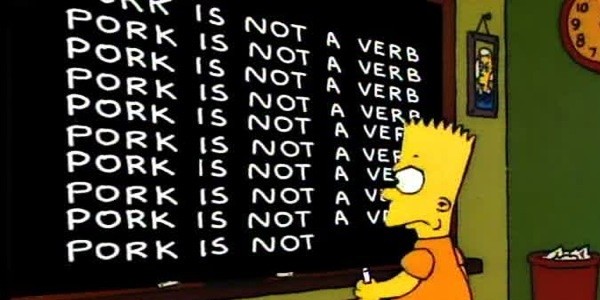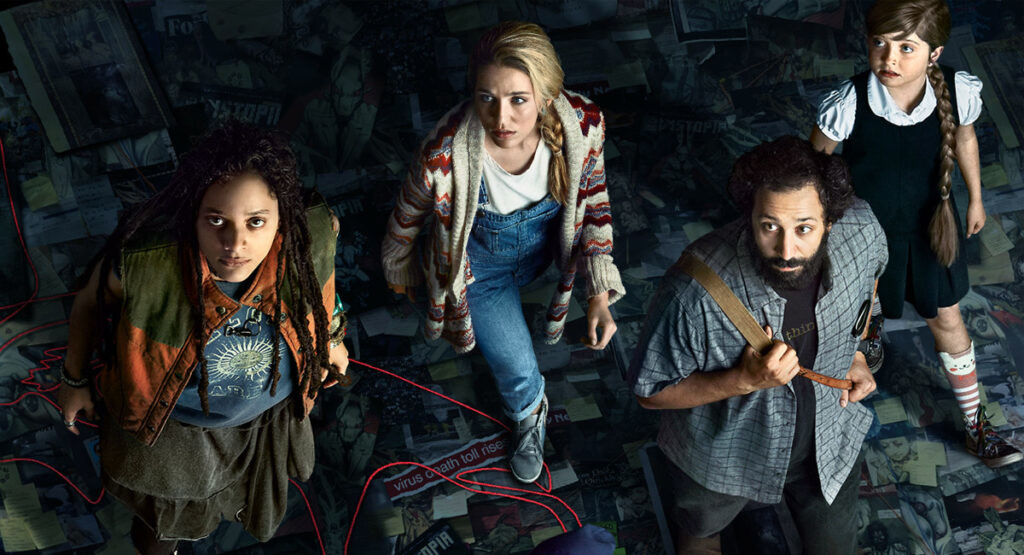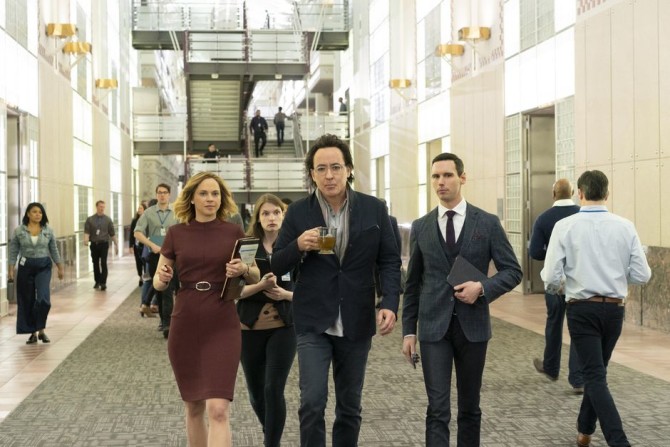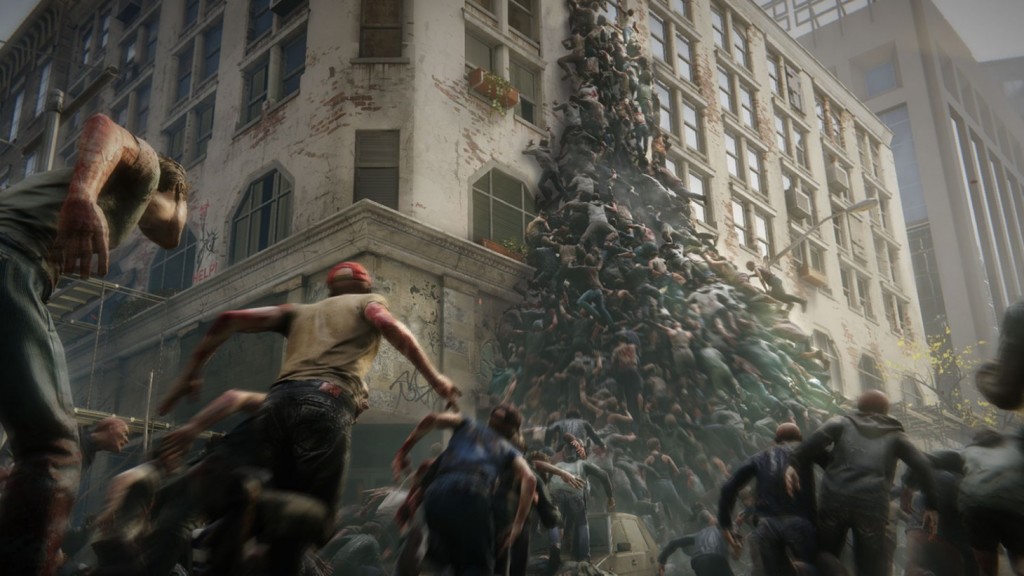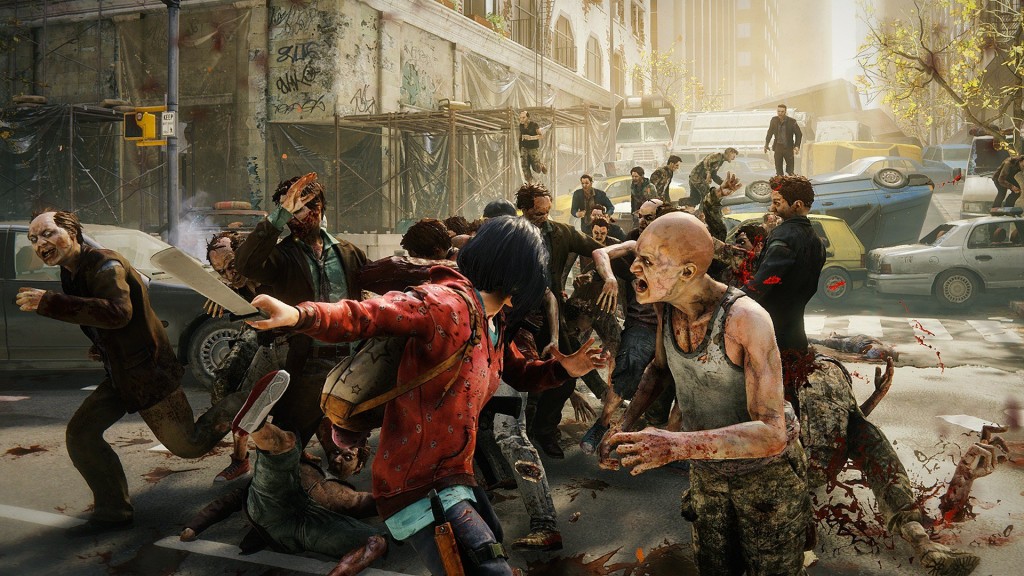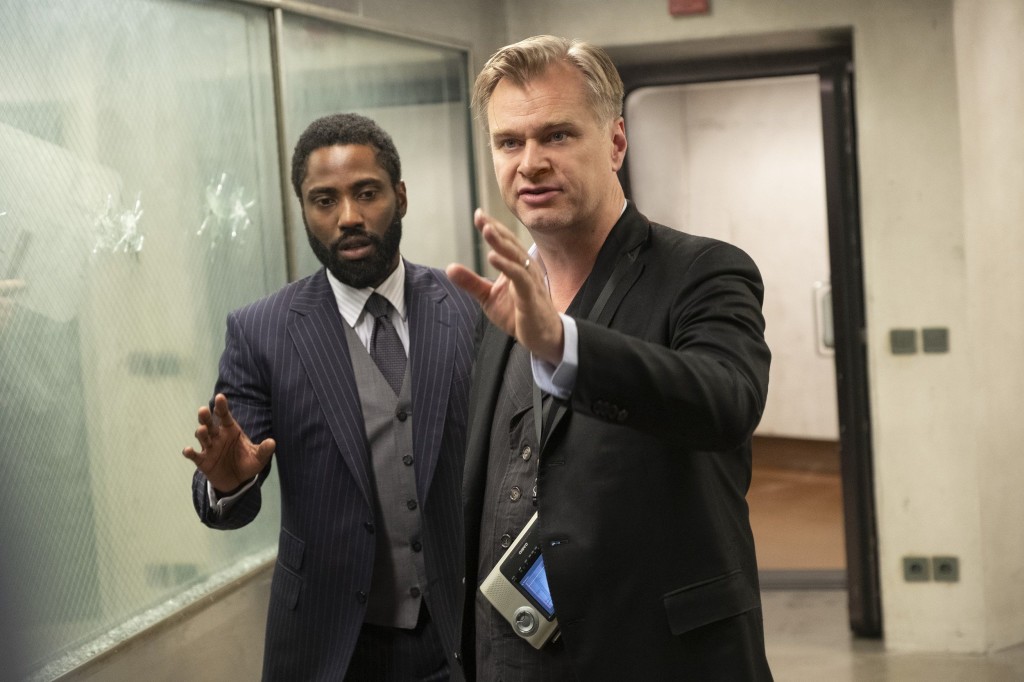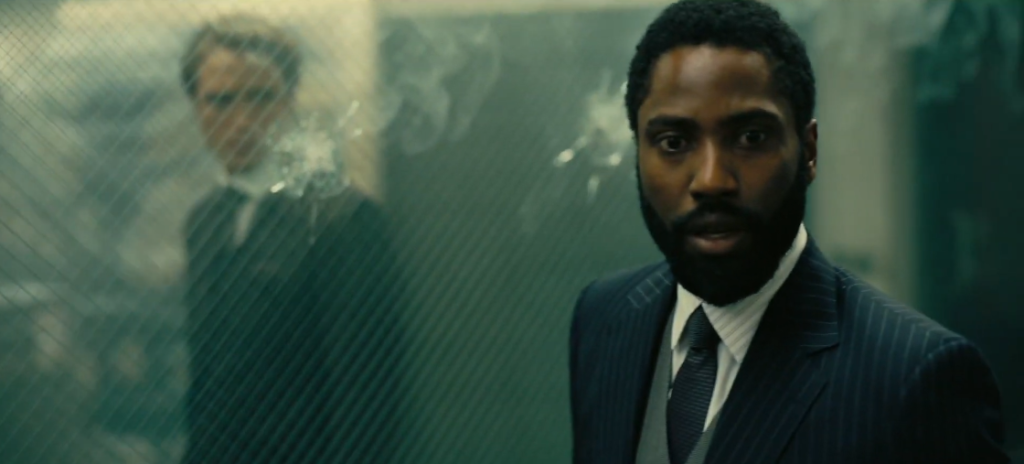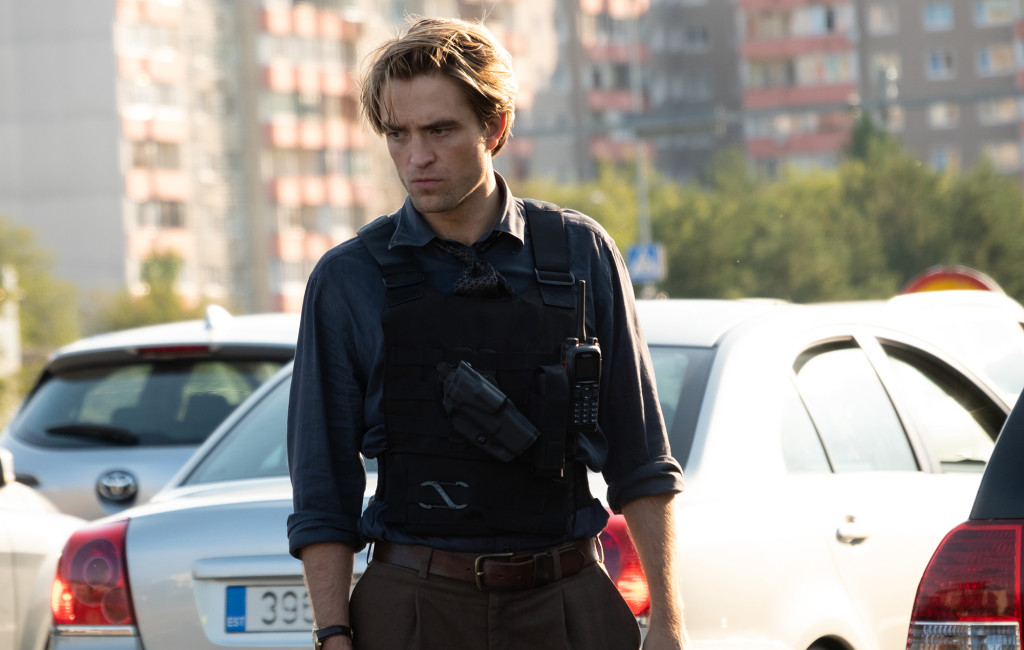The word on the street is that Pascal is out. Gone. No longer a part of The Mandalorian. He left mid-season because they refused to give him scenes with his helmet off. Ya gotta give it to Star Wars. This franchise loves drama.
How weird is this development? Well, it comes after learning, in the first season, that Pascal wasn’t even around for the show. They had John Wayne’s son in the Mandalorian suit instead (this is real! Look it up!).
So you’ve managed to make someone quit… who wasn’t even officially on the show. Only Star Wars, man. Only Kathleen Kennedy.
But let’s get to the trailer for season 2. Was it any good? It was pretty good. The Mandalorian is the closest thing so far to the original trilogy so it’s got that going for it. I love Baby Yoda putting up his “stroller shield.” That was fantabulously cute. I like the opening shot of a damaged ship. Not sure I’ve ever seen that before in a Star Wars property (not done like that, anyway). There isn’t a money shot but the trailer is solid. All Star Wars trailers are solid.
If you remember, I soured on The Mandalorian for two reasons. The lack of story connectivity was frustrating. Making this a pseudo anthology series goes against the connective tissue that helps make Star Wars so great.
But more frustrating was this choice to recruit second-tier Star Wars concepts from such shows as the animated “Star Wars: Rebels.” You’ve got our series villain now wielding something called the “dark sabre” which is such a dumb weapon concept I refuse to beleive it came from anyone over the age of eight.
The Mandalorian didn’t market itself that way. This is the series that started off with storm trooper helments on stakes. This is the series that opened up with a decapitation scene in a bar. Now we’re importing ideas from shows where every other character chimes in with a “I’ve got a bad feeling about this” before commercial break?
Star Wars is better than that.
And yes, I realize this is the franchise with little booping robots, characters named “Dooku,” and a giant slug for a villain. How is the dark sabre any different? I don’t know. I just know it is. This is why Star Wars has been so hard for so many creators to nail down. There are these indefinable variables that each fan has worked into their own “This is what Star Wars is” equations.
I will probably watch the series because the episodes are short and there’s bound to be one or two good episodes in the mix. Oh, and since Pascal is no longer around and there’s a rumor that Boba Fett is back from the dead, it might be fun to have Boba Fett kill the Mandalorian and slip into his armor moving forward. Talk about dramatic irony! We know this is Boba. But nobody else does.
That could get me back permanently. :)
There was a time, many years ago, where I thought the extensive analysis by a lot of the screenwriting teachers out there was overkill. I remember when Terry Rossio, on his site, Wordplayer, said he sometimes took weeks just to figure out the NAMES of his characters.
“Weeks?” I thought. They’re character names! Name them Bob, Jane, and Sara and move on to the important stuff!
Today? I couldn’t agree with him more. Names are soooooooo important. The right name projects an image in the reader’s head. Imagine if Hannibal Lecter had been named Bob Harris. Well-named characters also make a script way easier to read. Weak names that writers didn’t put any effort into are always the characters I forget first.
But this article isn’t about naming characters. At least not directly. Yesterday, in my “What I learned” section, I pointed out that different adverbs created a different impact in how the reader envisioned the character.
“Olivia, hair now pulled lazily back in a bandana…”.
“Olivia, hair now pulled defiantly back in a bandana…”.
“Olivia, hair now pulled playfully back in a bandana…”.
“Olivia, hair now pulled joylessly back in a bandana…”.
“Olivia, hair now pulled painfully back in a bandana…”.
There were some comments indicating it didn’t matter what you chose. It’s a stupid adverb so, so what? A reader is not going to like or dislike your pilot based on what adverb is used on page 5.
I understand this point of view because it’s the exact same point of view I used to have. It’s a tiny sentence in a sea of 25,000 words. There are bigger fish to fry than a dumb adverb.
But over time, I’ve learned that while not EVERY word matters, a lot of them do. Not understanding the importance of which moments need those stellar word choices is holding you back from taking your writing to the next level.
In the case of this adverb, there’s a lot more going on than you realize. Forgettable characters is one of the top five mistakes I encounter in script reading. Characters are either so weak, so bland, so generic, or so simplistic, that they leave zero impression on me and I’ve forgotten them within ten minutes of finishing the script.
I’ll read 10-20 scripts in a row where not a single character makes an impression on me. Which shouldn’t be surprising when you think back to your own recent moviegoing experiences. How many characters do you remember from the last ten movies you saw? And these are characters that have the benefit of an actor playing them. They’re easier to remember than characters who only have a name to remember. And still there are so many forgettable ones.
Another detail to keep in mind is that most characters are made or broken in their first few scenes. We either get a good feel for the character and are interested in seeing more of them or we’re apathetic towards them and have little interest in seeing more.
So what you say early on about a character MATTERS. It matters A LOT. I wrote an article about this. I think it was titled, The Fastest Way to Improve Your Script Right Now, and it talked about the importance of your characters’ introduction scenes.
Screenwriters often make the mistake of assuming that the complex charming dynamic character they have in their head is just going to naturally ooze out onto the page, like syrup being poured over fresh pancakes. That’s not how it works, folks. You must use targeted words and actions to properly sell your character to the reader.
Let’s say you have a protagonist named Larry. It’s early in the script. This is one of Larry’s first scenes. Larry is driving home from work and he gets to a stoplight with a sign that says, ‘No right turn on red.’
This is a prime opportunity for a reader to tell us about the character. Larry can wait patiently all the way until the light turns green or he can check both ways to make sure he doesn’t see any cops, then take a right turn on red.
That little clip tells us a lot about Larry. In one instance, he’s a guy who always follows the rules. In the other, he’s an impatient dude who’s always taking shortcuts.
Now you may think to yourself, “Well that’s dumb Carson. It’s one small moment. Who cares?” Congratulations, you’ve just identified yourself as the writer who doesn’t think about the moments that EXPLAIN to the reader who your character is.
You defiantly know your rule-following protagonist will organically come out over the course of the screenplay. Guess what. You’re then also the one getting the note, “I never had a good feel this character.” By the way, that’s one of the most common notes I give. And it can be solved simply by putting more thought into the words and actions you give your characters early on.
That’s an example of an action. But let’s get back to words because that was the original inspiration for this article.
Let’s say Larry parks his car in his driveway, gets out, and walks inside. This may seem to most writers like an insignificant moment and, therefore, something to get out of the way as soon as possible. They have this great scene in their head about how Larry’s wife is mad at him so the quicker we get to that, the better.
But this is another opportunity to tell us more about Larry simply by THE WAY HE WALKS. Check out some options you have…
Larry walks to the house.
Larry struts to the house.
Larry proceeds to the house
Larry wanders towards the house.
The practice of tagging in more expressive verbs for common actions should never be about varying the way the read is presented. It should be about CONVEYING INFORMATION. Larry “walks” to the house gives us absolutely zero information. It’s so generic as to almost not exist.
But consider what a reader thinks when you say your hero “struts” to the house. That implies something. It implies a character who’s confident. Things are going well for him. It paints a picture for us of who this man is.
Same deal with “proceeds.” “Proceeds” has an almost robotic connotation. This is a man who deals in ones and zeroes. Not a lot of complexity. See house, proceed to house. In comparison, “wanders” implies Larry is more of a space cadet. Or maybe that his mind is somewhere else.
While this is a simplistic example, it’s one of the best representations of how powerful words are in a screenplay. By switching out just ONE WORD, we get three completely different versions of Larry. And when it’s early on in a script and the reader is desperately trying to get a handle on who all the characters are, stuff like this helps A TON.
You want to extend this practice out into the characters’ environments as well. If we’re in Larry’s office, the words you use can convey a ton about him. It doesn’t even have to be some pretty word or sentence. It can be matter of fact. “Larry’s desk is drowning in unfinished work.” That gives us a different feel for Larry than, “Larry’s desk is so spotless it shines.”
Again, you want to find words that place images into your readers’ heads. “Drowning” is better than “overwhelmed.” “Shines” is better than “really clean.” Coming up with strong visual words is always challenging but it’s better than writing the generic version. Generic thoughtless description leads to generic bland imagery in the reader’s head. The reader is never going to do the work for you. That’s your job.
Which brings us back to Olivia’s hair. Is it really that bad if we just say, “Olivia, hair now pulled back in a bandana?” No. This sentence will get the job done. But if this is your approach to writing in general, the chances that you’ve written a generic screenplay are high. Every scene is an opportunity to put us inside the movie with your characters. If you’re not taking that opportunity, the reading experience is often forgettable.
As tempting as it is to be lazy and give us the quick version, remember that readers not only appreciate you going the extra mile, but also have a lot more fun when you do so.
Carson does feature screenplay consultations, TV Pilot Consultations, and logline consultations. Logline consultations go for $25 a piece or $40 for unlimited tweaking. You get a 1-10 rating, a 200-word evaluation, and a rewrite of the logline. They’re extremely popular so if you haven’t tried one out yet, I encourage you to give it a shot. If you’re interested in any consultation package, e-mail Carsonreeves1@gmail.com with the subject line: CONSULTATION. Don’t start writing a script or sending a script out blind. Let Scriptshadow help you get it in shape first!
Genre: Drama/Sort of Supernatural
Premise: When the sequel to a fringe graphic novel masterpiece unexpectedly emerges, the lone copy draws a group of superfans from different walks of life to buy it in a one-day only auction.
About: We have some weird connections to yesterday’s World War Z 2 review. This show is based on a British show written by Dennis Kelly. Who wrote yesterday’s script? Dennis Kelly. This script is written by Gillian Flynn. Gillian Flynn adapted her own book, Gone Girl, for David Fincher, the man who was supposed to direct Dennis Kelly’s script for World War Z 2. Did you follow all that? The show has recruited John Cusack, Rainn Wilson, and Happy Death Day star, Jessica Rothe. It will premiere on Amazon Prime.
Writer: Gillian Flynn (based on the original show created by Dennis Kelly)
Details: 65 pages
When it comes to TV shows that have the potential to be great, HBO has re-taken the pole position. You may remember when AMC and FX had some really great shows. And even Netflix, for a while, until they went algorithm crazy, favoring wackadoodle experiments such as The Floor is Lava, over the next House of Cards. So when they put something into production, I pay attention.
And yet, somewhere along the way, HBO gave up on Utopia. This happens quite a bit. HBO has a TON of shows in development and only lets the cream of the crop into the on-air lineup. Which leaves us to wonder if Amazon Prime is receiving a 1998 Chevy Impala with a bad transmission or a 2020 Tesla with some of them bulletproof windows. Let’s all hope it’s the latter. Cause I need a new show to watch!
After inheriting her grandfather’s cabin, Olivia and her hubby, Ethan, find a dark disturbing graphic novel in his home titled “Utopia.” Ethan looks it up online and realizes that it’s a sequel to the small but fiercely loyal fanbase of a graphic novel titled “Dystopia.” Figuring this might mean some *ka-ching*, Ethan posts online that he’ll be selling Utopia to the highest bidder at FringeCon this weekend.
Over the next 30 pages, we meet all the players. There’s hot Samantha, who’s a super hardcore Dystopia nut. There’s Wilson Wilson, an intense private guy who thinks the whole world is after him. There’s Grant, a 10-year-old kid. There’s Becky, who has a rare disease but is in a relationship with fellow Dystopia obsessive, Ian, who lives with his grandma.
All of these people know each other online due to their intense love for Dystopia. But none of them have met in real life. They don’t even know that Grant is 10. They think he’s a photographer for supermodels. That’s about to change since they agree to all get together at FringeCon and bid on Utopia.
On to FringeCon we go, where Olivia and Ethan have set up a hotel room where bidders come in one at a time, get to look at a single page from the book, then make a bid. Highest bid wins. By the way, this is where I should tell you that everyone in the group believes Dystopia predicts the future. It’s predicted numerous pandemics since it came out. And the sequel is said to have bigger, more dire, predictions.
Everybody makes their bid but no one here is rich. The highest bid doesn’t even crack 1k. So it sucks for them when the well off Carson (as far as I know, no relation) shows up and says he wants to take the comic off the market… for 20 grand! Ethan and Olivia say, “Ka-Ching” and sell it, thinking they just made out like bandits.
Except that a couple of hours later, two sketchy-looking dudes, Arby and Rod, show up demanding to know where the graphic novel is. They inform them Carson bought it. He’s in the penthouse. That’s not enough for them. They want to know everybody who looked at it. (spoilers) Ethan and Olivia get the sense that these aren’t a couple of angry buyers. These are dangerous people. Their sense is correct, cause Arby and Rod kill them. They then head up to the penthouse, where they learn of a disturbing development. Grant, the 10-year-old kid, has stolen it. And he’s getting away. To be continued…
Utopia makes a bold choice here in deviating from the original. In the original, we start out with a gruesome murder. Flynn, however, uses the first 45 pages to set up characters. There’s barely any story or plot. It’s us meeting character after character.
Now you may say, wait a minute Carson. You told us never to do this. Why does Gillian Flynn get to do it? Well, here’s the thing. You don’t have to add any plot to the first 40 minutes of your pilot script either. But if you’re going to go down that road, you better…
a) be really good at character creation.
b) be really good with dialogue.
Gillian Flynn is good at both. Plus, she has an advantage. She’s working with established material which already did some of the heavy lifting for her. It was a character-centric show, so she has the baseline for her characters set. Also, any character who didn’t work in the previous show, she can get rid of and replace with a character she thinks up. That’s a nice luxury to have when you’re writing something. Because, in my opinion, character creation is the hardest part of writing.
The point is, if you’re not using plot to hook us, you need to have been told numerous times that your character writing is strong and/or that your dialogue is strong too. Because they’re what’s going to be front and center without plot. And even if they’re “kind of good,” readers are going to tune out. The characters need to be “really good” or better.
Now what I found interesting about Flynn’s Utopia was that it took the opposite approach to Kelly’s pilot. Kelly put the first kill scene in the pilot’s teaser. Flynn puts her first kill scene all the way at the end of the pilot.
Which of these is the better choice? Do you kill right away? Or do you LEAD UP to the kill?
Each has a different effect on the audience. If you kill in the opener, it immediately grabs our attention. But then it’s gone. We can’t use it again. Or, if we do, it’s not as surprising anymore and, therefore, less impactful.
When you lead up to a kill, it gives the reader something to look forward to. If we establish that Arby and Rod are bad guys looking to do bad things and they’re on their way to FringeCon, we the reader are pulled along by a powerful line of suspense. We know that these two bad guys are going to collide with our heroes, which means we’re going to keep reading to find out what happens.
The downside of this choice is, not a lot of exciting things are going to happen prior to this collision. This means the reader is mainly reading setup and exposition. Not exactly the most riveting story experience.
Still, I would say that the second option is better because you get much more out of it. You get all that ongoing suspense. Whereas, if you kill right away, you suck up some of the story’s air. We’ve already seen the worst. It’s like that bad movie, U.S. Marshalls, the unofficial sequel to The Fugitive. They had that amazing plane crash scene in the opener and then nothing else in the script came close to it.
The problem is Flynn’s Utopia doesn’t take advantage of the second option. It never implies that the kill is coming. It doesn’t even imply the bad guys are bad. So we don’t get any build-up of that suspense, of that anticipation. Which means the kill is a surprise.
In screenwriting, you want to get the most bang for your buck out of every plot development. If the only entertainment we get from a scene happens within the scene itself, you’re leaving a ton of entertainment on the table. The right move would’ve been to heavily imply that Arby and Rod were going to do very bad things, which would’ve gotten so much more out of this plot point. As it stands, we get that surprising kill and— then it’s done.
But like I said, the characters are all really strong here. So I still enjoyed the experience. I still want to see what happens next.
Oh, and I wanted to give you guys a THIRD VARIABLE example from Utopia since I talked about that last Thursday. When Olivia and Ethan first find the book, they need to figure out what the book is. So they go on the internet on his phone. Now, we could’ve stopped there. He checks Google. Google tells them. Exposition handled. Scene over. But because they’re out in the middle of nowhere, Ethan keeps losing the connection in the middle of a Youtube explanation of what Utopia is. This is the THIRD VARIABLE that makes the scene more interesting. The explanation keeps stalling, forcing them to keep moving, creating more suspense, and making what could’ve been a boring straight-exposition scene into something a little more dramatic.
This show could be good assuming episodes 4-10 don’t devolve into “running around with your heads cut off” storytelling. I hope Flynn has a plan for that!
[ ] What the hell did I just read?
[ ] wasn’t for me
[xx] worth the read
[ ] impressive
[ ] genius
What I learned: “Olivia, hair now pulled pragmatically back in a bandana…”. This is an early description in the script. The funny thing is that I read it as “dramatically” instead of “pragmatically,” which created a different image in my head. Like she really went all out on putting her hair back. But when I realized it was “pragmatically,” I thought, “Oh, that’s more straight-forward,” and my image of the visual changed. This reminded me how much words matter when describing things, particularly adverbs. And how you can use them to change the tenor of the image. Note how all of these adverb substitutions create different images in your head, as well as make you think of Olivia differently.
“Olivia, hair now pulled lazily back in a bandana…”.
“Olivia, hair now pulled carefully back in a bandana…”.
“Olivia, hair now pulled defiantly back in a bandana…”.
“Olivia, hair now pulled playfully back in a bandana…”.
“Olivia, hair now pulled sharply back in a bandana…”.
“Olivia, hair now pulled joylessly back in a bandana…”.
“Olivia, hair now pulled painfully back in a bandana…”.
I read so many scripts where I never get any sense of the characters at all. Little things such as including the perfect adverb can help solve that problem. Not to mention, it’s a lot of fun trying to find the right adverb.
Genre: Zombie/Action
Premise: Humans have found a temporary vaccine that makes them invisible to the zombie enemy. Now they just need to eradicate them with a new biological weapon, a weapon the humans are finding out might make their enemy even more dangerous.
About: For a good year there, David Fincher really wanted to direct World War Z 2 with his buddy, Brad Pitt. It would’ve been the biggest film he’d ever made. For whatever reason, though, Paramount kept waffling. In retrospect, it seems ridiculous to me. Being the smallest of the studios, you’d think Paramount would jump at the chance to trot out a David Fincher zombie movie starring Pitt. I guess they couldn’t make the numbers work though. At least for now. Paramount doesn’t own much flashy IP so you gotta think this is going to get made at some point. I’m sure Fincher would be open to it so just make the call, Paramount!
Writer: Dennis Kelly
Details: April 5, 2016 draft (123 pages)
The original World War Z project went through some interesting iterations. The book the film was based on followed the aftermath of a zombie outbreak. It was a unique take on zombies, to say the least, since it didn’t have zombies in it. It was more about the investigation into how the outbreak happened and who was responsible.
I remember reading an early draft of the script that was loyal to the book and thinking, “Wow, they are taking a gigantic risk making a zombie movie that isn’t about zombies.” The people over at Paramount must’ve agreed cause they ditched that take and went back in time to cover the exciting part – the actual zombie world war!
Mileage varied on whether that film was good or not but I liked it. I especially liked Brad Pitt’s scarf. It’s up in the air as to whether Paramount will ever get back in the World War Z business. Let’s see if they’re overlooking a surefire hit.
Gerry is back! (Gerry is Brad Pitt by the way – points for whoever knew that). The humans have taken a major step in defeating the zombies (called “Z”) after Gerry was able to secure a vaccine in the last film that made humans invisible to zombies by mimicking cancer. The Z only want healthy hosts so they ignore anyone who’s using the “camouflage,” which lasts for about a day before you can use it again.
The sucky part is that there are still Z everywhere. They’ve taken over almost every major city. The humans need a way to fight them and that’s come in the form of something called E29, a biological weapon of sorts that, when sprayed on Z, makes them kill each other. Doctor Morel is putting the finishing touches on the weapon in Geneva. Gerry just needs to grab it from her.
So he flies to Geneva, where everyone now lives underground in the former Large Hadron Collider. Millions of people live down here because the entirety of Europe has been overrun by Z. Gerry can’t help but wonder as he heads to the medical center… “What if someone down here gets infected?” Yeah, we’re thinking the same thing, Gerry.
Once they get to Morel’s office, they find out she’s gone. Locked up shop and vanished. They then break into her lab only to find numerous scientist Zs in there. They need to find out what happened so they all inject themselves with the camouflage and walk inside. Except the Zs don’t ignore them. They attack them!!!
Gerry runs out of the lab and the infection starts spreading VERY FAST. Everyone is getting bit and turning instantly. Soon, tens of thousands of zombies are blocking out the side exits. Gerry is forced with a few others to go DEEPER inside the Large Hadron Collider. They eventually find a shaft that gets them topside, but the damage is already done. This place is toast.
Gerry meets up with his air team and now it’s off to Singapore, where it’s said that Morel is. Gerry gets to the outskirts of Singapore where a rag-tag team of humans is holding Morel hostage and Gerry is able to ask her what the eff is going on! She concedes that E29 doesn’t work. It reverses the camouflage, which is why the Zs don’t sense it anymore. Oh, and there’s a new threat. The Zs have figured out how to transmit the disease THROUGH THE AIR. I mean, WTF!?? As if they didn’t have enough to worry about.
To make matters worse, they need to get to a local UN base on an island, and the only way there is through downtown Singapore, a former city that now houses 5 millions Zs. These Zs haven’t yet been infected by Morel’s faulty biological weapon, which means our team can still walk through the city worry-free, since the camouflage works on them. The only issue is that everyone in the group is already at the end of a previous camouflage cycle. So they can’t re-inject it. They just have to hope they finish their walk before it wears off.
The new plan is to meet up with a second scientist who may know how to counteract the faulty E29. That plan is put in jeopardy, however, when Anna, Morel’s daughter’s, camouflage wears out. Now they have to hurry to the pier that will get them to the island, all without 5 million hungry zombies devouring them. I’m hoping for the best. But it sure doesn’t look good for our tiny team of Singapore sightseers.
Let’s start off by helping the beginners in the audience.
Lesson 1: One of the simplest ways to start a story is to give your hero something they want. That will set them off on a path of action, and the obstacles that will get in the way of the path will provide conflict, drama, and hopefully, lots of entertainment.
The ‘want’ here is Doctor Morel. She has the weapon. So we need to go find her.
Lesson 2 is that a “want” should never be easy. If your characters can easily find whatever they’re looking for, there isn’t going to be drama in your story. So you need the unexpected to happen. You need things to go wrong. When Gerry gets to Geneva, Morel is already gone. And not just gone. Gone under mysterious circumstances.
This juices up the story because now we’re not just trying to find her. We’re curious why she chose to mysteriously disappear.
A script is basically a repeating series of this pattern. Your hero will eventually find Morel. From there, you create another “want.” Here, it’s a second scientist, which isn’t my favorite choice. I don’t like repeated plot beats. It’s usually better if the new want is different. But it’s better than nothing.
In The Matrix, the first “want” is to find out what the Matrix is. The second “want” is to go see the Oracle to see if he’s “the one.” The third “want” is that Morpheus has been kidnapped and they have to rescue him.
This script is actually chock full of screenwriting lessons. Another well utilized lesson in WWZ 2 is that you set up rules to break rules. No, I’m not talking about the rules of screenwriting. I’m talking about the rules of your fictional world.
One of the first things we learn (it’s on the very first page, actually) is that camouflage protects the humans from the zombies. The zombies will not pay attention to you if you’ve injected it.
If you go through your entire script and that rule is never challenged, you’re a bad writer. The whole point of creating rules like that is to break them later in a dramatically fun way. They do that when they first encounter the Large Hadron zombies in the underground lab. All the marines are injected, told not to worry, and they walk in there, not a worry in the world. And then… RAHAREHAHJAFHLDK!!!!!IAJLFKDAALAF. Zombie mayhem.
You created the rule to break the rule. Always a strong narrative move.
And the camouflage was the gift that kept on giving in this script. I loved that they had to depend on the camouflage in a city of 5 million zombies, when they’d just seen that it didn’t work and when they know the vaccine in their veins is almost at the end of its cycle. I can only imagine how great a scene it would be onscreen to have to walk through 50,000 zombies hoping that your vaccine still has enough gas in the tank.
Overall, I found this script to be fun. It is similar to the first film. They’re not breaking any new ground. But the new rules (camouflage, N29, air transmission) add just enough of a spark to keep the concept fresh.
Honestly, with a lot of the less-than-stellar content Paramount puts out, I’m shocked that they haven’t made this movie. It’s definitely one of the top properties over there. It’s time to get Fincher back on the phone. After shooting an artsy black and white movie, he’ll be thrilled to make something big and fun like this.
[ ] What the hell did I just read?
[ ] wasn’t for me
[x] worth the read
[ ] impressive
[ ] genius
What I learned: A match hasn’t started until someone breaks serve. Tennis reference tip! In tennis, you are supposed to win (or “hold”) all your service games. This is because serving gives you an advantage. You are smashing the ball down on the other player, who must struggle to return the ball. This ensures that you almost always win your service games. Therefore, when someone “breaks” serve (the returner wins the game from the server), the match takes on a new energy. It means whoever broke serve has a clear path to win the set if they continue to hold their own serve the rest of the way. There’s a similar saying in screenplays: A script hasn’t begun until something goes wrong. Nowhere is this more evident than in World War Z 2. The script is heavy with exposition and setup all the way up to the Large Hadron Collider location. The script has just barely kept our interest so far. But when they break into the lab only to find that a bunch of zombies are waiting ANNNND these zombies aren’t phased by the “camouflage” vaccine, something has OFFICIALLY GONE WRONG and the script takes on a new energy. That’s the way you do it. Make sure to carefully craft your “break serve” moment as it tends to be the moment that the reader really latches in and commits to the experience.
What I learned 2: Send your characters to the place they DON’T want to go. Not to the place they do. In the Collider scene, they watch as a swarm of zombies block out all the exits. This forces the characters to go FURTHER INTO THE CIRCLE, the exact opposite thing they want to do. Which makes for a more exciting sequence.
Genre: Sci-Fi/Spy Thriller
Premise: (from IMDB) Armed with only one word, Tenet, and fighting for the survival of the entire world, a Protagonist journeys through a twilight world of international espionage on a mission that will unfold in something beyond real time.
About: Tenet has had a complicated release journey. There was all this behind-the-scenes talk about how Christopher Nolan wanted Tenet to be the film that saved the movie business. He wasn’t just releasing this for Warner Brothers. He was releasing it for the world! But it’s said Nolan nearly had a heart attack when it was suggested that Tenet would need to be played in – GASP – drive-in theaters! All of a sudden, Nolan considered waiting until the pandemic was over. In the end, the movie was forced into an unenviable staggered release pattern. Some places would get it, some wouldn’t, which would make box office boasting – a key marketing tool for studios – difficult. Tenet isn’t even playing in my home town, Hollywood. How ironic is that? I had to travel down to San Diego to see the film. But see the film I did.
Writer: Christopher Nolan
Details: 150 minutes
Tenet.
It’ll open the right doors.
Some of the wrong ones too.
That’s a line from the movie. Which is apropos considering Christopher Nolan himself has opened some of the right doors with Tenet, but also many of the wrong ones.
The Protagonist (yes, that’s our hero’s name) is a CIA agent who tries to kill himself via a suicide pill rather than give up his men. But it wasn’t a suicide pill. It was a test. To see who was willing to go the distance. Now that he’s proven his worth, he’s been recruited into a next level mission. It’s called Tenet. Unfortunately, that’s all he’s told. I guess the Protagonist will have to figure out the rest on his own!
He eventually meets up with a female version of Morpheus who explains what “tenet” is – it’s time inversion. The secret tenet gatekeepers keep finding these small artifacts – such as bullets – that do things backwards. So instead of shooting the bullet, you “receive” the bullet back into the gun. Female Morpheus doesn’t know where these artifacts are coming from. That will be the Protagonists’s job.
A lot of stuff happens here but, long story short, the Protagonist bumps into a sloppy drunk named Neil, who may or may not work for a secret organization, and the two interrogate the manufacturer of the inverted bullets, a billionaire Indian woman named Priya. It turns out these bullets are being manufactured in the future. So Priya doesn’t even know she’s manufactured them yet (or does she? Tenet).
All signs of these inverted weapons point to a Russian oligarch named Andrei Sator. Sator is so big time that the Protagonist’s only way in is through his wife, Kat. Kat hates Sator, so there’s an opening there. She’s only still with him because he refuses to give her her son if she leaves. To prove his value to Kat, the Protagonist steals a painting for her. Okay, she says, she’ll introduce him.
The details are complicated, but to sum it up, Sator is secretly receiving gold and inverted weapons from his future self. This is what’s allowed him to become so freaking rich. He has also been searching for seven deliberately hidden pieces of a super weapon in the past from the future (Tenet). Once he finds all seven pieces, he will activate them, creating a super-inversion situation whereby the present and future will collide and the world will be destroyed.
Sator momentarily lets the Protagonist into his inner circle when he learns that he knows about tenet. Meanwhile, the Protagonist’s buddy, Neil, is looking for that seventh and final piece to the Wand of Inversion. They must get that final piece before Sator does. It’s the only way to stop the extinction level event. But then everything is complicated when it’s revealed that Sator has rigged himself so that if he commits suicide, the inversion event will happen automatically. I think. You think. Maybe. Maybe not? Tenet.
The one inarguable thing I’ve always said about Christopher Nolan is that he’s a great filmmaker.
He shoots everything in camera. There are no special effects. He’s said in numerous interviews that he believes the audience can feel when something has been done for real as opposed to with computer graphics. And I agree with that.
He casts his movies well. Everybody here is awesome. John David Washington is the perfect 2020 movie star. He’s got that screen presence a movie star needs yet he’s not too masculine. He almost has this cool feminine side to his demeanor that balances him out, making him easily accessible to audiences. I’m in love with Elizabeth Debicki. On the contrary, there’s something almost inaccessible about her that makes her alluring. She may be the perfect female star for a Christopher Nolan film. Kenneth Branaugh is over the top here, but my desire to see Sator go down proves that whatever he was doing was effective. Even Robert Pattinson was solid. He certainly looks good in those suits they dressed him up in.
And just the production value of a Christopher Nolan movie is so impressive. There was this moment around the halfway point where the characters are all out on one of those double-pontoon sailing skiffs. That scene did a better job of transporting me to another place than anything I’ve seen so far this year. Cause, to me, that’s what a Hollywood movie should do. It should take you to places you’ve never been. Show you things you’ve never seen.
And as much grief as I give Nolan for his pretentious film school approach (I mean who titles their main character “The Protagonist” other than an insufferable pretentious film school student? Come on.), he’s literally the only mega budget filmmaker making his own stuff. Without him, it’s all Disney and Marvel folks.
Maybe that’s why it’s so frustrating that Tenet didn’t work.
I fear that Nolan is approaching George Lucas level bubble territory. That elusive world where nobody says ‘no’ to you because of how successful you are. And this is the type of movie that requires a strong “no” person. It’s such a heady concept that if you don’t have people in your circle saying, “I don’t understand that, it needs to be clearer,” the movie isn’t going to work. And that appears to be what happened.
I mean there’s this moment early on where Female Morpheus is explaining to the Protagonist how inversion works. She hints at this idea of a Matrix like situation. That you can control this power. He tries to make the bullet come up to his hand but it won’t. “You have to drop it first” she says. He tries again, this time the bullet comes into his hand. But he didn’t drop it. She literally said, “You have to drop it first.” And he didn’t drop it and it still came up to his hand. The fact that nobody stopped to ask if the audience would be confused after that moment encapsulated what was wrong here.
The insurmountable issue with Tenet is that “inversion” is a difficult concept to understand. The more you think about it, the less it makes sense. That’s why you’re getting so many reactions that describe the film as “frustrating.” Because people don’t understand how the central concept of the film works.
One of the reasons the Matrix was so great was because its central concept was so easy to understand. “We’re unknowingly living in a virtual reality.” Boom. Understood! Tenet is the opposite. Even right now, as I’m writing this, I’m trying to figure out if inverted objects work under a different set of rules than inverted people. Aren’t inverted people on a pre-set tape? They’ve already gone that way (backwards), so there’s nothing you can do to stop them. These objects, however, you seem to be able to do unique things to them on a repeatable basis. Make them go backwards into your gun over and over again, for example. How does that make sense?
Nolan only makes things harder on himself with a borderline incomprehensible plot. I could take a UCLA course on why the Protagonist needed to a) steal a painting and b) do it by crashing an airplane and still not understand the logic, or what it had to do with the rest of the movie. He only exacerbates this issue by extending the film out to two and a half hours. It gives the audience even more time to get lost.
Maybe the best representation of what went wrong with this movie was the climax. In theory, it was a fun idea. You’re using both regular and inverted soldiers to obtain the final piece of the staff. I love that idea. But that’s all it ended up being, an idea. The actual execution was bizarre. We’re seeing soldiers head onto the battlefield while, simultaneously, soldiers leave the battlefield via the inverted timeline. They had already been through the mission.
So my first thought was, “Well then you already know you were successful, right?” But then I thought, “Wait, those are the different soldiers. Not the same ones.” “Or wait, are they the same soldiers?” The fact that I was still asking these questions this late in the game confirms how poorly the rules were explained to us. Because, at this point, I should be enjoying the moment. Instead, I’m trying to make sense of it all.
Nolan needs a “No” man moving forward or he’s in danger of becoming a parody of himself. A lot of us saw this as far back as Inception, which relied too heavily on exposition. Then came Interstellar, which had a lazy wonky structure. And now this. An idea that doesn’t even work at the concept stage.
Look, Nolan is a great filmmaker. Nobody argues that. But he needs to take a hard look in the mirror when it comes to his writing. He’s not doing himself any favors there. The one clean narrative he’s had out of his last four films was Dunkirk and the reason for that is that the timeline was simple. Everything happened on the same day. Moving forward, focus on what you’re good at – the directing side. But when it comes to writing, unless you’re going to hire people whose professional job it is to write, don’t do any more of these overly complicated concepts with sprawling narratives. They don’t hold together.
[ ] What the hell did I just watch?
[x] wasn’t for me
[ ] worth the price of admission
[ ] impressive
[ ] genius
What I learned: You want your ending to be the biggest exploitation of your concept of the entire movie. Tenet got this right. The movie is about time inversion. So what better an ending than throwing both regular AND inverted soldiers at the enemy? Sort of an “attack on the Death Star” but with multiple timeines happening at once. The only reason it didn’t work was because the concept was weak to begin with. But this is the right move as a screenwriter. If your movie is about dinosaurs on an island, your climax better deliver the best dinosaur versus human situation we could possibly imagine. It shouldn’t feature a plane crash.

